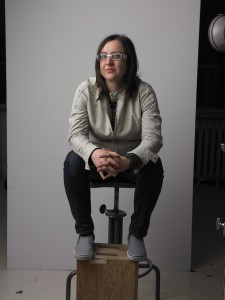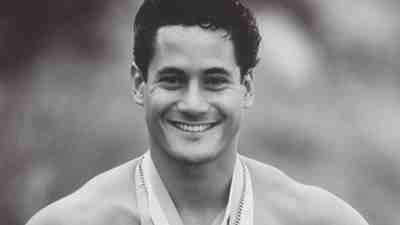Cinema Speak with Sydney-Chanele is a new column that embraces the landscape of film, filmmakers, and film festivals. This will be a canvas where film reviews, and in-depth interviews into the filmmaking process will be shared, and the world of cinephiles will be celebrated. A dedicated space to cinema outside the mainstream, the emphasis of Cinema Speak with Sydney-Chanele will be foreign cinema, independent films, documentaries and the filmmakers who make them.
AFI DOCS (June 18-22, 2014) is a 5-day international documentary film festival that serves as a launch pad for independent documentaries and has built a reputation for presenting the best new documentaries to the Washington, D.C. area. Now in its 12th year, AFI DOCS is the only festival of its kind to take these compelling and engaging films and connect audiences and documentary filmmakers together with the nation’s “changemakers.”
Cheryl Furjanic

When Cheryl Furjanic isn’t working as a filmmaker, she teaches documentary filmmaking as a Media Production Specialist in the graduate Program in Culture & Media at New York University, where she has taught for last fourteen years.
Cheryl is the director of Sync or Swim, her first feature film, and her latest documentaryon Greg Louganis, Back on Board: Greg Louganis makes its world premiere at the 2014 AFI DOCS Film Festival.
________________
What is your new documentary Back on Board: Greg Louganis about?
Our film Back on Board: Greg Louganis is an intimate portrait of the public triumphs and private struggles of trailblazing openly gay athlete Greg Louganis. It’s a candid documentary film about this four-time Olympic champion and it follows Greg Louganis over the past three years as he struggles with financial security and reunites with the sport he once dominated but not welcomed in. The threat of losing his house during the recent financial crisis forces Louganis to re-evaluate the choices, relationships, and missed opportunities of his career.
Our film chronicles Louganis’ rise from a difficult upbringing to nearly universal acclaim as the greatest diver ever, to the pioneering openly gay athlete with HIV, to an overlooked sports icon. Back on Board is the engrossing story of an American legend as he reemerges on the world stage to combat prejudice, promote tolerance, and return to the diving world after a long period of absence to act as a mentor to the next generation.

How did you first encounter this story, and what was the determining factor in wanting to make a film?
In this case my producer Will Sweeney, who is a friend from film school, had heard about Greg Louganis’ return to the sport of diving as a coach and mentor. He knew immediately that it would make a great documentary. My last documentary, Sync or Swim, was about the journey to the Olympics by the 2004 U.S. Olympic Synchronized Swimming team. Because of that film, Will thought a documentary about Louganis would be a good fit for me to direct. I didn’t think I was really ready to make another movie at the time, but Will was persistent. We reached out to Greg and started shooting pretty quickly. Access was never one of our problems!
Why do you make documentaries?
Two words: “George Stoney.” I didn’t know much about documentary at the time but I was eager to learn about all aspects and all genres of filmmaking. Also at the time, Pulp Fiction had just come out and some students were trying to emulate that style of filmmaking. So I was consciously moving away from that while searching, yearning, for something that resonated with me. And that something ended up being George’s class called “Documentary Traditions,” a two-semester course. I just felt like I was “home” there – in George’s class, in the documentary genre, and later in the documentary community. It really was like a switch that flipped for me.
Was there an experience or specific event when you knew you wanted to be a filmmaker?
I had just started school at SUNY Binghamton. I thought I wanted to be a doctor but I didn’t really want to take Chemistry and Biology in the first semester of my freshman year. I wrote down a class called Cinema 101 as an “alternate class.” I spent the semester studying the history of film with Professor Mike Zryd. It just felt so exciting and so right. Writing papers about movies in college felt like play to me!
Basically I just fell for movies – there in that dark classroom with Mike at the helm. The next semester I studied Super-8 filmmaking with Ken Jacobs and I thought the idea of being a filmmaker was totally amazing. It was all really magical in a way I hadn’t experienced. At around the same time my mom had gotten a job at NYU and my parents told me that NYU had a great film program. The following year I transferred into the film school at NYU and the rest is history.
What was your first filmmaking experience?
Wow, I guess my very first film was probably something I made while studying with Ken Jacobs at SUNY Binghamton. The class was called “Film Artmaking” and it was an experimental film class where we shot on Super-8 B&W reversal film. So, some of these were experiments in the way that the film reacted to light and shadows. Others were very short feminist films like one called Heads Off where I used stop motion animation to have Barbie remove her own head and throw it away. Mostly I was experimenting with the camera, with storytelling, and with form. When I got to film school, I tried a little of everything – fiction, documentary, comedy. After film school I made some short films, one of which is a fiction comedy. I really have always loved the process of making films.
Does your filmmaking pay the bills, or do you work another job to make ends meet?
I feel very lucky to pay my bills by teaching documentary filmmaking! For the last 14 years I’ve been a documentary production instructor in the graduate Program in Culture & Media at New York University. This is a joint course of study offered by the departments of Anthropology Department and Cinema Studies. My filmmaking really informs my teaching and my teaching really informs my film work.
AFI DOCS Festival Film
Does Back on Board have a distributor and what do you think is the film’s impact?
We do not yet have a distributor for our film but we are confident that we will find it a good home. Since we started shooting this film, several athletes have come out publicly. Greg’s story speaks to so many current issues facing our society today. LGBT issues in sports have really come to the forefront of the national – and international – conversation.
What research, writing, and editing process did you do for this film?
Our original idea for the film was to follow Greg through one season of coaching and tell the story of his life through those experiences. But soon after we started shooting, Greg stopped coaching and we realized that that wasn’t the story we were meant to tell. So I spent a lot of time just talking with Greg in between shoots – trying to figure out which of the things going on in his life seemed like they would be good for the film. It’s funny to think back about things that seemed really significant early on while we were still trying to find the story.
There aren’t many people who live most of their lives so publicly, and in front of so many cameras. We didn’t set out to tell as much of our story through archival footage as we ended up doing. In addition, Greg allowed us access to all of his own personal archives and that opened up even more possibilities. Our editors Karen K.H. Sim and Jessica Thompson did an incredible job of working with this material to support the story we were telling.

From conception to completion how long did it take you to make this film, and how did you handle the financing?
Our film took just over three years from inception to completion. Will sent me an article about Greg’s return to diving in March 2011 with the note, “Let’s make this movie!” That was the beginning. We finished the film in May 2014.
This story took longer to tell than we thought it would, and developed in ways we hadn’t expected. As a result the film cost more than we expected that it would. In raising funds, we raised the bulk of our funds through tax-deductible donations to our fiscal sponsor the Center for Independent Documentary. We ran a really successful Kickstarter campaign about a year into production. Last summer one of our Associate Producer’s Robby Browne threw us a fantastic NYC Rooftop Fundraising Party. We got a few grants from foundations and non-profits along the way. We are still paying for some of the expenses and still looking for tax-deductible donations! But in the end, it was all worth it. We wouldn’t change a thing.
Cheryl, what do you hope audiences will take away after viewing?
I hope audiences are as inspired as we are by Greg’s story. There is a focus and determination and, above all, resilience that Greg possesses that I think is really incredible to behold. In watching our film I do hope that people can take some of that spirit from Greg’s story and think about it in reference to their own lives and struggles.
Inspirations & A Deeper Look
Do you have a history with the AFI DOCS Festival?
I am a huge fan of the AFI DOCS Festival! I have been involved with this festival for years. My first feature film Sync or Swim screened here in 2008. A former student of mine at NYU’s Culture & Media Program (from many moons ago) Sky Sitney was the festival director here for many years.
Do you believe going to film school is an advantage? How did it best prepare you to be a filmmaker?
I think if you can surround yourself with people who are as “into” and consumed by the thing you’re into as you are, that’s always a great learning environment – even if it’s not a formal school setting. I got my BFA from NYU’s Maurice Kanbar Institute of Film & Television. I don’t know if film school would be an advantage for everyone, but it was for me.
Will Sweeney(Producer/Co-Writer of Back on Board: Greg Louganis) and Amanda Keropian (Co-Producer of Back on Board: Greg Louganis and Producer of my first feature Sync or Swim) were both in on of my first film classes at NYU. So for me it was a combination of the relationships I build with students and teachers, along with the inspiration of being taught by working filmmakers at NYU that were so important to me. I don’t think film school is necessary for this but that was the path I took and I’m thankful for it!
What are your all-time favorite documentaries?
Wow, that’s a tough one. I’ll list a few I could watch over and over again: This Film is Not Yet Rated by Kirby Dick, Forever by Heddy Honigmann, and An Injury To One by Travis Wilkerson.
What living filmmakers are your inspirations? What inspires you to continue with this form of storytelling?
Of the filmmakers working today, most of all I’m inspired by Heddy Honnigmann. I saw her work at the Flaherty Film Seminar many years ago and I fell in love with it immediately. I love seeing the relationships she has on the screen. Also, I love the work of Judith Helfand (full disclosure: I was the Associate Producer on Judith Helfand and Dan Gold’s 2002 doc Blue Vinyl). At George Stoney’s recommendation I saw Judith’s film A Healthy Baby Girl and have been hooked on her work ever since.
One thing that I try to teach my students every year is that documentary filmmaking is all about relationships – between a filmmaker and the folks in front of the camera, between the director and the crew, between members of the crew, between the crew and the equipment, between the filmmakers and the funders. And all of those relationships are reflected on screen. Those relationships are what a documentary film is made of. Developing and cultivating and maintaining these relationships is what inspires me to keep going.
How have you grown as filmmaker since your first film, and how have you changed?
During the process of making my first feature documentary Sync or Swim I made a few very short comedy fiction films (less than 1 minute each). Then I started making really, really short “documentaries” (under 5-10 seconds). These were little nonfiction life moments – the kind that have since become a genre of their own with Vine or video on Instagram. At the time, though, these films were partly born out of the constraints of my camera or phone (which, in those days, couldn’t record more than 30 seconds of video at a time) and partly born out of my need to start and finish a project – because Sync or Swim took a lot longer than I thought it would.
Back on Board: Greg Louganis took about half the time to make that Sync or Swim did. I can see and feel how I do things differently now as a filmmaker than when I started. No matter what genre I’m working in, though, I want my films to have heart, I want to treat the people in my films with respect, I want my films to move people, to make audiences smile and think and, hopefully, to have to have some moments of lightheartedness.
AFI DOCS SCREENINGS
BACK ON BOARD (Running Time: 88 min.)
Tickets can be purchased at the box office or online.
Friday, June 20,2014 at 4:45 p.m.at The Portrait Gallery
Saturday, June 21, 2014 at 1:45 p.m. at AFI Silver
AFI Silver is located at 8633 Colesville Road, in Silver Spring, MD 20910.
Metro: AFI Silver Theatre is walking distance from the Silver Spring Metro Stop on the Red Line.
Parking: There are two public garages that offer convenient access to AFI DOCS: the Wayne Avenue. Garage between Georgia Avenue. and Fenton Street, and the Town Square Garage at the corner of Ellsworth Drive and Fenton Street.
LINK:
Cinema Speak with Sydney-Chanele: AFI DOCS FESTIVAL: Lucy Walker – The Lion’s Mouth Opens by Sydney-Chanele Dawkins




